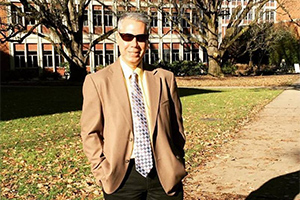David Vázquez Joins AU to Build Latinx Studies Program Program will reside within new Department of Critical Race, Gender, and Culture

Associate Professor of Literature David J. Vázquez has joined American University to launch a Latinx Studies Program, which will reside in the new Department of Critical Race, Gender, and Culture (CRGC).
Vázquez comes to AU from the University of Oregon, where he was the head of the English Department. He is also a former director of the university’s Center for Latino and Latin American Studies, as well as an associate professor of English and an affiliated faculty member in the Department of Ethnic Studies and the Program in Environmental Studies. He taught courses on comparative Latinx literature, comparative ethnic American literature, critical race theory, environmental justice, and twentieth-century US literature.
Vazquez is a prolific and influential author in the field of Latinx Studies. His first book Triangulations: Narrative Strategies for Navigating Latino Identity (University of Minnesota Press 2011) examines how Latina/o autobiographical texts, written after the rise of cultural nationalism in the 1960s, challenge mainstream notions of individual identity and national belonging in the United States. He also co-edited Latinx Environmentalisms: Place, Justice, and the Decolonial (Temple University Press 2019), which maps the ways Latinx authors and cultural producers express environmental concerns in their work.
His other publications have appeared in the journals Symbolism, Contemporary Literature, Latino Studies, CENTRO, The Journal of Transnational American Studies, and in the collections the Routledge Companion to Latina/o Literature (Routledge 2012) and Erasing Public Memory: Race, Aesthetics and Cultural Amnesia in the Americas (Mercer 2007).
Vázquez says he’s excited for the opportunity to build American University’s Latinx Studies Program from the ground up. He was working as an administrator for the past five years at the University of Oregon, and he wanted to get back into the classroom. “I wanted to build in my field. And the Latinx community at AU and in the DMV (District of Columbia, Maryland, and Virginia) really appealed to me,” he says. “It seemed like the perfect opportunity at the perfect time.”
Eileen Findlay, chair of the Department of Critical Race, Gender, and Culture, says that CRGC faculty (and everyone across campus who is committed to Latinx Studies) are thrilled to welcome Vázquez to AU. “David brings a long history of successful collaborative work as a program builder, scholar, and social justice advocate on many fronts,” she says. “He is smart, funny, kind, and deeply committed to building community. He also is one of the few scholars we found in two years of searching whose scholarship and teaching engaged with a multiplicity of Latinx experiences.”
Latinx Studies at American University
Latinx Studies will join five existing interdisciplinary programs within the new Department of Critical Race, Gender, and Culture: African and African American Diaspora Studies, American Studies, Arab World Studies, Asian Studies, and Women, Gender, and Sexuality Studies.
Latinx Studies is a fast-growing branch of US race and ethnic studies, with an explosion of journals, books, conferences, and publications focusing on the field over the past several years. It examines the histories and cultures of Latin American-origin people in the United States as racialized minorities, including Nuyoricans, Chicana/os, Central-Americans, and others.
“Latinx Studies emerged out of Chicano/Mexican American Studies, Puerto Rican Studies, and other branches of race and ethnic studies” says Vázquez. “Although Latinx Studies hasn’t subsumed these fields, it has grown to be inclusive of them. Latinx Studies is fundamentally more comparative (meaning it tends to compare various Latin American-origin communities such as Puerto Rican, Dominican, Central American, Mexican/Mexican American, etc.), although there are still many scholars who identify with Latinx Studies who study single communities (Chicanx/Mexican American, Salvadoran, etc.).”
Building a Program
Vázquez says his first goal at American University is to listen and learn about what people on the ground are already doing in the area of Latinx Studies classes and coursework. “I see my role as carrying the ball in terms of establishing a major program housed in CRGC, but I really hope to build consensus and a strong community.”
He’s working to establish a Latinx Studies minor by pulling together existing AU courses, and he will also teach an Introduction to Latinx Studies class this fall. “Recent events are reminding us to pay attention to Black and brown people ,” he says. “Black and brown people have been thinking, writing, and creating works of art that resist racism and marginalization since before the United States existed. In this course, we’ll focus on Latina/o/xs, with an eye toward how they create literature, films, and visual art. We’ll study these expressive works in order to understand how Latina/oxs document our historical presences and contest the ways we have been exploited and marginalized.”
Next spring, he is exploring the idea of an environmental justice class, which would correspond with his research for his latest book. The timing is critical, he says. “We are at a tipping point in terms of an environmental emergency and a race relations crisis. The degradation of the environment is just another manifestation of colonialism and racism. It’s difficult to think of an effective environmental movement without a wholescale revision of how we think of a world without exploitation.”
As his first, priority, however, Vázquez says he welcomes hearing from students and faculty. “I’m really interested in conversations that will help shape this important field of study at American University.”
